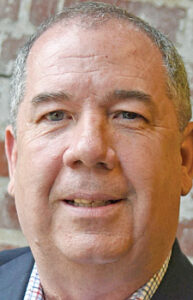
A shopper walks into a convenience store at the end of a long day.
Between the sodas and the alcohol, the shopper picks up a seltzer that is labeled as containing hemp-derived Delta-9 THC. With a drivers’ license proving they’re over 21 years old, they purchase the drink. But is that legal, just because it was on the shelf?
Not necessarily, Starkville Police Chief Mark Ballard told The Dispatch. He said his department is trying to be proactive with education, combating confusion coming from conflict between federal and state law on hemp-derived THC beverages.
“It is a new product that is challenging the confusion of the laws,” Ballard said. “It’s where science is by far outleading legislation. We have laws that we’re operating by and (an Attorney General’s) opinion, and that’s where we are with this.”
Hemp was legalized nationwide in 2018 with the Agricultural Improvement Act, or the “Farm Bill.” That bill included a threshold to separate hemp from cannabis, specifically 0.3% or more THC by dry weight. Hemp was also removed from Schedule I of the Controlled Substances Act, opening the door for the creation of hemp-derived CBD products.
The same threshold for hemp and cannabis is also recognized by the Mississippi Hemp Cultivation Act and the Medical Cannabis Act. The latter established the sale of THC products above the 0.3% threshold only by licensed dispensaries.
The U.S. industrial hemp market is now an industry worth billions of dollars, according to reports from the Associated Press.
But Mississippi Attorney General Lynn Fitch issued an opinion against hemp-derived THC beverages on Sept. 9, drawing from a state law saying the sale of any drug, compound or preparation would be unlawful if “when drunk to excess, in the form sold, will produce intoxication,” unless it is otherwise legalized by state law.
Testing whether a hemp-derived beverage would produce intoxication is outside the scope of the opinion, Fitch wrote, meaning the opinion cannot on its own terms ban hemp beverages. Also, AG opinions are not law.
The opinion goes on to read, “notably, neither the act nor any other state law specifically addresses the sale of hemp beverages.”
What’s actually in the drinks?
Ballard raised concerns around the consumption of hemp-derived beverages, including the lack of regulation in manufacturing and issues around mislabeling in the industry.
Testing on hemp-based beverages on the Gulf coast found that, despite their labels, the drinks sometimes contained 20 times the legal amount of THC. The drinks also contained pesticides and microtoxins, he said.
House Bill 1502 would have regulated the production of consumable hemp products, requiring all hemp-derived THC beverages to avoid packaging intentionally enticing to minors, a certificate of analysis for all drinks sold, and a limit on the legal amount of THC in hemp beverages. That bill died on the Senate floor in April.
With concerns around manufacturing still in play, Ballard said, SPD has started purchasing hemp-derived THC beverages and sending them to the crime lab for testing.
Since business owners are often confused on the topic, Ballard said, he has taken the approach of education, warning and then enforcing the issue.
In Lowndes County, Sheriff Eddie Hawkins said he has done the same in his investigations with different kinds of hemp-derived products.
“These products, by law, can legally be sold if those product contains 0.3% of THC or less, which is a very low dosage,” Hawkins said. “However, some of these products that we’ve seen on the shelves, and we’ve tested, the THC content in these products are much greater. Sometimes 35, 40% THC levels.”
Reacting to conflicting laws
Matt Bogue, president for Dutch Oil Company and partner with Sprint Mart, said his company has elected to not sell any hemp-derived THC-infused beverages without more clarity in regulations.
“We take great pride in our reputation as a responsible retailer of age-restricted products in compliance with State and Federal laws,” Bogue wrote in an email to The Dispatch. “Until there is better clarity on the regulatory guidelines around these products, we will remain on the sidelines.”
Bogue said he has seen the market for THC-infused beverages grow over time, which he said “underscores the real need for regulation,” including in manufacturing. He said the legislature needs to pass the “common sense” legislation in HB 1502 sooner rather than later.
Ashley Ray, who owns and operates Brewskis and other businesses under the Crissey family of stores in Starkville, said her business started selling hemp-derived beverages about a year ago. She said the popularity of the drinks has picked up over time.
“We have some people that, that’s what they come in and get … since it’s been an option,” Ray said. “But it’s definitely growing in popularity, a little bit at a time, and I think that’s just the knowledge of it being out there.”
Because laws on the subject are not very clear, Ray depends on Mississippi’s three-tier alcohol distribution regulation system to inform what she puts in her store. That system ensures accountability and transparency through regulation of brewers, distributors and then retailers.
Ray works with Mitchell Distributing as the distributor for her store.
“The distributor is typically who deals with the legality of a product,” Ray said. “That’s not necessarily us. So if a distribution company picks up a hemp product, their legal team does all the ground work for if it’s legal in the area, things along those lines.”
Mitchell Distributing did not respond to requests for comment from The Dispatch by press time.
Beyond the letter of the law
Hawkins said he believes the presence of hemp-derived products with low THC percentages in convenience stores could lead to them being easily accessed by minors. Instead, they should only be sold through a licensed dispensary, he said.
“In my opinion, if these products are going to be sold in the state of Mississippi, the legislature needs to regulate it and put it behind the counters in dispensaries only, so somebody with a medical marijuana card can purchase it,” Hawkins said.
Ray objected to both of those ideas. She said there should instead be heavier punishments for minors using a fake identification card to better regulate their access. She also said the hemp-derived products are vastly different from those sold in medical dispensaries.
“The milligrams they would be able to use in a dispensary are vastly different, and also (prescribed) by a physician,” Ray said. “This is not like that. That would be like asking a physician to prescribe you vodka.”
Hawkins and Ballard also brought up concerns about combining these new beverages and driving. Both law enforcement officials said they have seen driving under the influence cases related to cannabis rise with the number of products available on the market.
While the legal limit to drive with alcohol in your system is 0.08%, any amount of cannabis in a driver’s system can lead to a DUI arrest. But even more than that, Ballard said, driving under the influence can lead to traffic accidents and potential fatalities.
“You can have multiple drinks within an hour and feel no effect,” Ballard said. “That delayed effect, when you get into a vehicle and you start to drive, can then hit you. That’s why it’s a … huge public safety concern.”
Quality, in-depth journalism is essential to a healthy community. The Dispatch brings you the most complete reporting and insightful commentary in the Golden Triangle, but we need your help to continue our efforts. In the past week, our reporters have posted 32 articles to cdispatch.com. Please consider subscribing to our website for only $2.30 per week to help support local journalism and our community.
#related_posts { border-top: 1px solid #f0eeee; margin: 2rem 0;
}
#related_posts h2 { margin-top: 25px;
} #related_posts ul { padding: 0; list-style-type: none; display: flex; flex-wrap: wrap;
}
#related_posts ul li { width: 100%; flex: 50%; display: flex; align-items: flex-start; gap: 20px; margin-bottom: 20px; border-bottom: 1px solid #f0eeee; padding-bottom: 20px;
} #related_posts ul li:nth-child(3),
#related_posts ul li:last-child { border-bottom: 0;
} .relatedcontent { padding-right: 20px;
} .relatedcontent h3 { font-family: var(–noto-sans); font-size: 1rem; line-height: 25px; margin: 0 0 15px 0;
}
.relatedcontent .single-author { margin-top: 0;
} article.post .relatedcontent a { text-decoration: none; font-weight: 700;
} .relatedthumb img { max-width: 200px;
} @media only screen and (max-width:1140px ) { #related_posts ul li { flex: 100%; } #related_posts ul li:nth-child(3) { border-bottom: 1px solid #f0eeee; }
} @media only screen and (max-width:1095px ) { #related_posts ul li { flex-direction: column; } #related_posts ul li:nth-child(3) { border-bottom: 1px solid #f0eeee; } #related_posts ul li:last-child { border-bottom: 0; } .relatedthumb img { max-width: 100%; }
}
.image-wrap { margin-bottom:2rem;
}
.image-wrap img {
width:100%;
} .slider{ max-width:750px;
}
.slider .image-caption { margin:.5rem 0 1rem;
}



